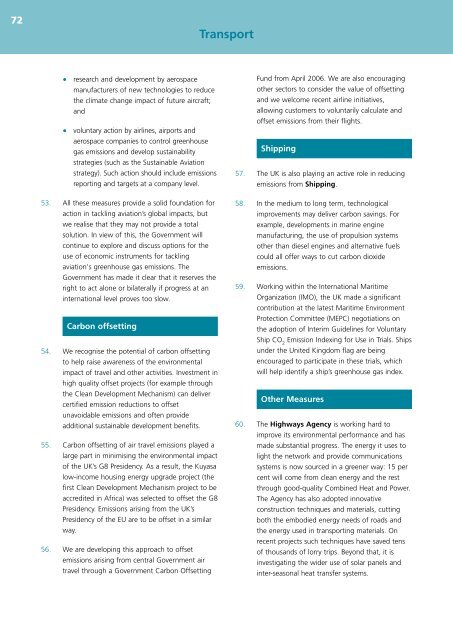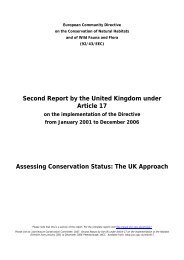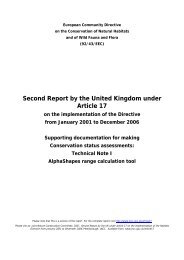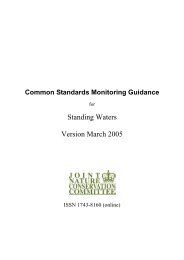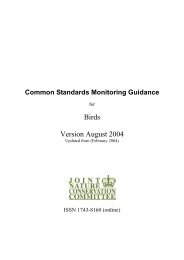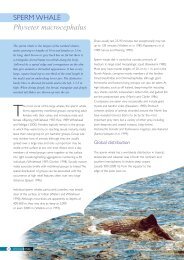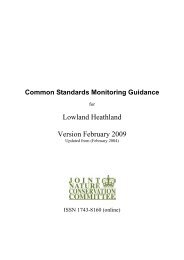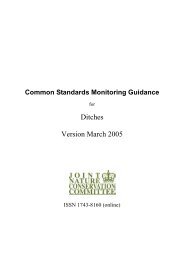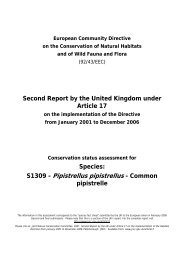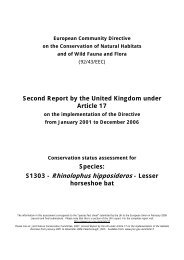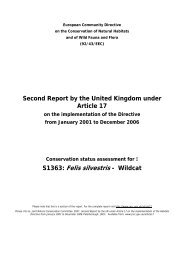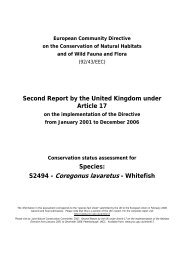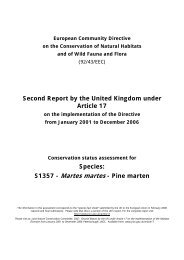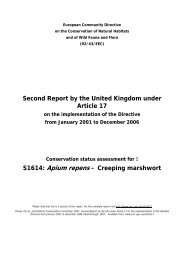UK Climate Change Programme 2006 - JNCC - Defra
UK Climate Change Programme 2006 - JNCC - Defra
UK Climate Change Programme 2006 - JNCC - Defra
You also want an ePaper? Increase the reach of your titles
YUMPU automatically turns print PDFs into web optimized ePapers that Google loves.
72<br />
Transport<br />
• research and development by aerospace<br />
manufacturers of new technologies to reduce<br />
the climate change impact of future aircraft;<br />
and<br />
• voluntary action by airlines, airports and<br />
aerospace companies to control greenhouse<br />
gas emissions and develop sustainability<br />
strategies (such as the Sustainable Aviation<br />
strategy). Such action should include emissions<br />
reporting and targets at a company level.<br />
53. All these measures provide a solid foundation for<br />
action in tackling aviation’s global impacts, but<br />
we realise that they may not provide a total<br />
solution. In view of this, the Government will<br />
continue to explore and discuss options for the<br />
use of economic instruments for tackling<br />
aviation's greenhouse gas emissions. The<br />
Government has made it clear that it reserves the<br />
right to act alone or bilaterally if progress at an<br />
international level proves too slow.<br />
Carbon offsetting<br />
54. We recognise the potential of carbon offsetting<br />
to help raise awareness of the environmental<br />
impact of travel and other activities. Investment in<br />
high quality offset projects (for example through<br />
the Clean Development Mechanism) can deliver<br />
certified emission reductions to offset<br />
unavoidable emissions and often provide<br />
additional sustainable development benefits.<br />
55. Carbon offsetting of air travel emissions played a<br />
large part in minimising the environmental impact<br />
of the <strong>UK</strong>’s G8 Presidency. As a result, the Kuyasa<br />
low-income housing energy upgrade project (the<br />
first Clean Development Mechanism project to be<br />
accredited in Africa) was selected to offset the G8<br />
Presidency. Emissions arising from the <strong>UK</strong>’s<br />
Presidency of the EU are to be offset in a similar<br />
way.<br />
56. We are developing this approach to offset<br />
emissions arising from central Government air<br />
travel through a Government Carbon Offsetting<br />
Fund from April <strong>2006</strong>. We are also encouraging<br />
other sectors to consider the value of offsetting<br />
and we welcome recent airline initiatives,<br />
allowing customers to voluntarily calculate and<br />
offset emissions from their flights.<br />
Shipping<br />
57. The <strong>UK</strong> is also playing an active role in reducing<br />
emissions from Shipping.<br />
58. In the medium to long term, technological<br />
improvements may deliver carbon savings. For<br />
example, developments in marine engine<br />
manufacturing, the use of propulsion systems<br />
other than diesel engines and alternative fuels<br />
could all offer ways to cut carbon dioxide<br />
emissions.<br />
59. Working within the International Maritime<br />
Organization (IMO), the <strong>UK</strong> made a significant<br />
contribution at the latest Maritime Environment<br />
Protection Committee (MEPC) negotiations on<br />
the adoption of Interim Guidelines for Voluntary<br />
Ship CO 2<br />
Emission Indexing for Use in Trials. Ships<br />
under the United Kingdom flag are being<br />
encouraged to participate in these trials, which<br />
will help identify a ship’s greenhouse gas index.<br />
Other Measures<br />
60. The Highways Agency is working hard to<br />
improve its environmental performance and has<br />
made substantial progress. The energy it uses to<br />
light the network and provide communications<br />
systems is now sourced in a greener way: 15 per<br />
cent will come from clean energy and the rest<br />
through good-quality Combined Heat and Power.<br />
The Agency has also adopted innovative<br />
construction techniques and materials, cutting<br />
both the embodied energy needs of roads and<br />
the energy used in transporting materials. On<br />
recent projects such techniques have saved tens<br />
of thousands of lorry trips. Beyond that, it is<br />
investigating the wider use of solar panels and<br />
inter-seasonal heat transfer systems.


